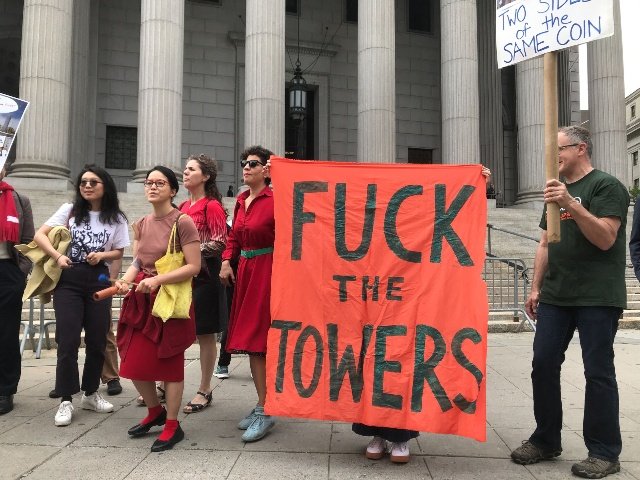Judge Grants Temporary Halt On Two Bridges Mega Development After Hearing Three Lawsuits
June 5, 2019, 6:34 p.m.
'These are huge towers,' Judge Arthur Engoron said. 'I’ve lived in the city my whole life. You can’t just do this because the zoning allows it. I just can’t believe this is the case.'

Protesters against the Two Bridges development outside court today.
A state Supreme Court judge has extended a temporary halt on the controversial Two Bridges project, following a day's worth of testimony on three lawsuits accusing the city of illegally approving the multi-billion dollar development of four high-rise towers on the Lower East Side and Chinatown.
Judge Arthur Engoron said he would render his final decision in early August, but in statements that drew applause from the roughly 50 community activists that had stayed until the end, he said there was merit in the opposition’s arguments.
“These are huge towers,” he said. “I’ve lived in the city my whole life. You can’t just do this because the zoning allows it. I just can’t believe this is the case.”
In December, the City Planning Commission voted to move the projects forward without a formal public land use review process, over the vigorous objections from some members of the community and elected officials. The plan, which consists of four separate high rise towers—one of which will be a 1,008-foot supertall—has become a rallying cry for activists who accuse the de Blasio administration of acquiescing to the desires of luxury developers.
The mayor has said the city needs to allow taller high-rises to help solve the affordable housing crisis. Under his watch, the city passed an inclusionary zoning rule that mandates 25% of units in buildings be below-market rate in certain areas or if developers seek greater density.
In January, the City Council and Manhattan Borough President Gale Brewer sued the city and the Two Bridges developers for avoiding the public land use review process, known as ULURP, which requires final approval by the City Council.
Then in March, a coalition of Lower East Side and Chinatown community groups filed another lawsuit that went even further, arguing that the development should not proceed under any condition, ULURP or otherwise.
Another collection of community groups — Tenants United Fighting for the Lower East Side, Organizing Asian Communities, Good Old Lower East Side, Land’s End One Tenants Association and LaGuardia Houses Tenants’ Association — also filed their own lawsuit against the project.

The proposed Two Bridges development. (Courtesy of Handel Architects)
The heart of the cases rests on whether the city was correct in granting the development teams behind Two Bridges a request for a change to a 1972 plan that was created to regulate development in the area. Both sides spent Wednesday morning hashing over the language and intent over that original document.
In particular, the city and developers’ attorneys have defended the project by saying that it only required what is being called a “minor modification.”
The project's opponents, meanwhile, have argued that the proposed height and density of the four projects amounts to much more than a “minor” update.
At one point, Judge Engoron expressed skepticism about how any update to the site plan could be interpreted as minor.
“That’s like the whole ballgame here, right?” he asked. “If you can change the site plan you can do whatever you want.”
The estimated $4.5 billion development would have over 2,700 new residential units, of which 25 percent, or 690 units, would be affordable, and 11,000 square feet for retail. Two hundred of the affordable units would be set aside for seniors.
Although the affordable rent rates are still to be determined, based on the income ranges of other mixed-income projects, critics of the Two Bridges development contend that most of the affordable apartments would be out of reach for neighborhood residents. In another wrinkle, the City Council and Borough President later discovered that one of the parcels contained a deed restriction that requires the property to be developed for low-income seniors and disabled residents.
The developers are JDS Development Group, a joint venture of L+M Development Partners and CIM Group, and Starrett Development.
Prior to the judge’s ruling on the temporary restraining order, a spokesman for the developers issued a statement saying that the lawsuits were “wholly without merit” and stressing the affordable units and the roughly $70 million that they plan to contribute to public improvements.
“At a moment when projects that stand to deliver tens of thousands of jobs and hundreds of millions in community investment are being opposed by anti-development sentiment across the city, it’s important to remember that those actions are not without direct consequences for the communities that stand to benefit,” the statement said.
Following the decision, the developers' spokesman added: “The Judge’s decision to extend the TRO for two months does not impact the projects because construction was not planned to start imminently.”
Bill de Blasio seeking the presidency is “a cruel joke to the highest order,” says anti Two Bridges organizer pic.twitter.com/iZHoDjVlIE
— Elizabeth Kim (@lizkimtweets) June 5, 2019
Prior to the hearing, several community groups staged a rally outside the courthouse, turning the issue into an indictment of the de Blasio administration's push for high-density development.
Referring to the mayor’s presidential aspirations, Yanin Pena, an organizer with Youth Against Displacement, said, “This is a cruel joke of the highest order.”
De Blasio, she said, has created “a sanctuary city for rich developers and turned hardworking workers into refugees.”
Reached for comment, a spokesman for the city's Law Department responded to the decision, saying, “We are disappointed with this ruling. We respectfully disagree with the court’s preliminary findings. The approvals made by the City were appropriate and we will continue to defend against the claims challenging these important projects.”
UPDATE: This story has been updated with a statement from the city's Law Department and an additional response from the developers' spokesman.